PRINCETON, NJ -- The results of a July 25-27 USA Today/║┌┴¤═° poll suggest that Americans split down the middle on the complex issue of whether the United States should set an explicit timetable or target date for the removal of U.S. troops from Iraq -- when it is made clear that withdrawal is a given in either circumstance.
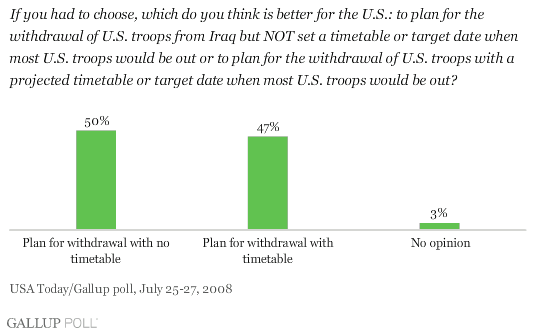
The question wording from this poll was developed to reflect as well as possible the positions of the two major-party presidential candidates on Iraq.
Both candidates have indicated in their policy positions that they favor the ultimate withdrawal of troops from Iraq, but they differ in terms of specifying a timetable for that withdrawal.
- Barack Obama's official Web site says: "Obama will give his Secretary of Defense and military commanders a new mission in Iraq: ending the war. The removal of our troops will be responsible and phased, directed by military commanders on the ground and done in consultation with the Iraqi government. Military experts believe we can safely redeploy combat brigades from Iraq at a pace of one to two brigades a month that would remove them in 16 months."
- John McCain's Web site says: "I do not want to keep our troops in Iraq a minute longer than necessary to secure our interests there. Our goal is an Iraq that can stand on its own as a democratic ally and a responsible force for peace in its neighborhood. Our goal is an Iraq that no longer needs American troops. And I believe we can achieve that goal, perhaps sooner than many imagine. But I do not believe that anyone should make promises as a candidate for president that they cannot keep if elected. To promise a withdrawal of our forces from Iraq, regardless of the calamitous consequences to the Iraqi people, our most vital interests, and the future of the Middle East, is the height of irresponsibility. It is a failure of leadership."
The differences in the two candidates' positions focus on the explicitness with which a timetable for withdrawal should be announced and planned for ahead of time. Obama's statement specifies a timetable and target date, while McCain's specifically cautions against setting a date or timetable.
Thus, the question wording used in the USA Today/║┌┴¤═° poll outlined two positions on the issue (without any reference to specific candidates or others who might support that position) and explicitly told respondents that both positions were based on an assumption of a withdrawal of troops. The difference in the two positions as read to respondents was the issue of whether there was a "timetable or target date when most U.S. troops would be out."
The results, as noted, show an almost even split, with 50% choosing the "no timetable" alternative and 47% choosing the "timetable" alternative.
Even though no candidate names are mentioned in the question wording, there are predictable and very large differences in response by partisanship.
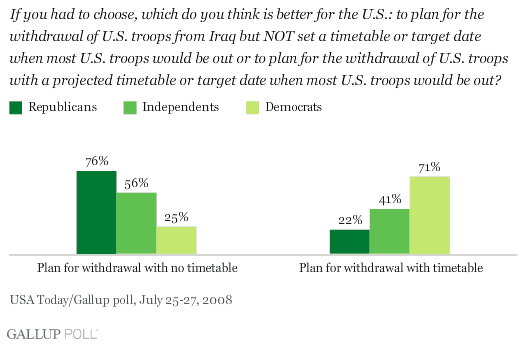
The slight overall 3-point edge in support for withdrawal without a timetable is a result of the slightly stronger Republican feelings on this question (compared to those of Democrats), and the tendency of independents to tilt in the "no timetable" direction -- despite the fact that at this point, self-identified Democrats outnumber Republicans in the American populace.
Other Ways of Asking
A review of questions other polling organizations have asked about an Iraq timetable shows that the results obtained depend to a certain degree on the way in which the question is worded.
For example, a July 10-13 ABC ║┌┴¤═°/Washington Post poll preceded the actual question about the timetable with specific references to the fact that Obama had proposed a timetable and that McCain had not.
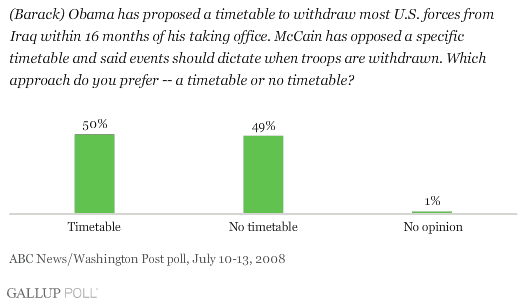
The results of this poll show an even split, echoing the rough parity in support for the two candidates in the general population.
On the other hand, CNN/Opinion Research recently asked a straightforward question without reference to either the candidates or specifying that withdrawal would be a given regardless of the timetable issue. The results show a strong public preference for a timetable.
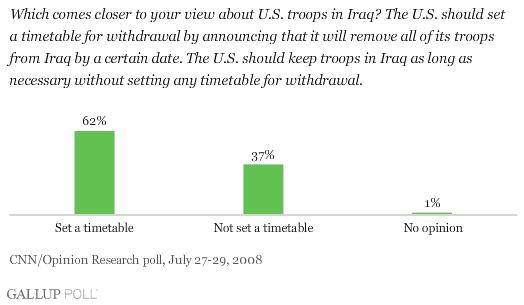
║┌┴¤═° has asked a similar question in the past, with wording as follows.
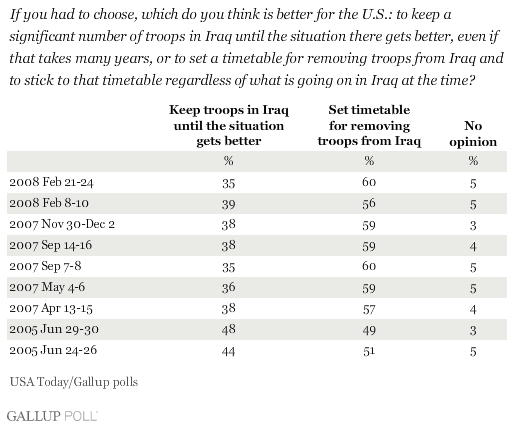
This ║┌┴¤═° version, at least when it was last asked some 5 1/2 months ago in February, showed a majority supporting a timetable.
Finally, there is the NBC ║┌┴¤═°/Wall Street Journal question concerning an Iraq timetable.
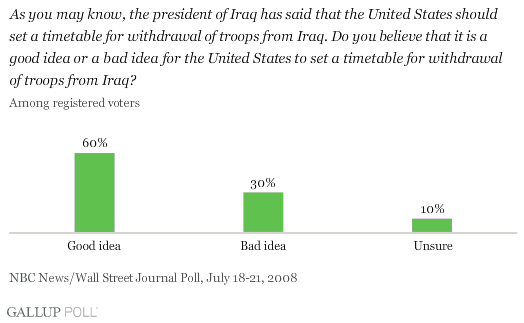
This question wording provides the respondent with the explicit information about the Iraqi president's statement, the effect of which on respondents cannot be determined precisely, although it can be hypothesized that this wording may have increased the probability of respondents agreeing with the timetable idea given the reminder of official Iraqi backing.
Implications
The review of these questions concerning a timetable for Iraq suggests that American attitudes on the topic depend to a degree on the way in which the alternatives are presented to them. As has been witnessed in the arguments on a timetable going back and forth between the Obama and McCain campaigns, it is not a simple issue. While all concerned may assume that most American troops will eventually leave Iraq, just when and under what circumstances that will occur is a murky issue.
The public opinion data show that:
- Given a basic choice between a timetable and no timetable, the majority of Americans favor the timetable. This may reflect the concern or assumption that the "no timetable" option implies that troops will remain indefinitely.
- Citing the fact that the Iraqi president wants U.S. troops to withdraw, with a timetable, results in majority support for the idea.
- Reminding respondents that Obama has taken a "timetable" position and McCain has taken a "no timetable" position yields a split in results similar to the split in candidate support.
- Stipulating withdrawal as a given, with the only difference being a timetable versus no timetable for that withdrawal -- a phrasing that mirrors the presidential candidates' positions -- shows a split right down the middle in attitudes.
Survey Methods
Results are based on telephone interviews with 1,007 national adults, aged 18 and older, conducted July 25-27, 2008. For results based on the total sample of national adults, one can say with 95% confidence that the maximum margin of sampling error is ┬▒3 percentage points.
Interviews are conducted with respondents on land-line telephones (for respondents with a land-line telephone) and cellular phones (for respondents who are cell-phone only).
In addition to sampling error, question wording and practical difficulties in conducting surveys can introduce error or bias into the findings of public opinion polls.
To provide feedback or suggestions about how to improve ║┌┴¤═°.com, please e-mail feedback@gallup.com.
